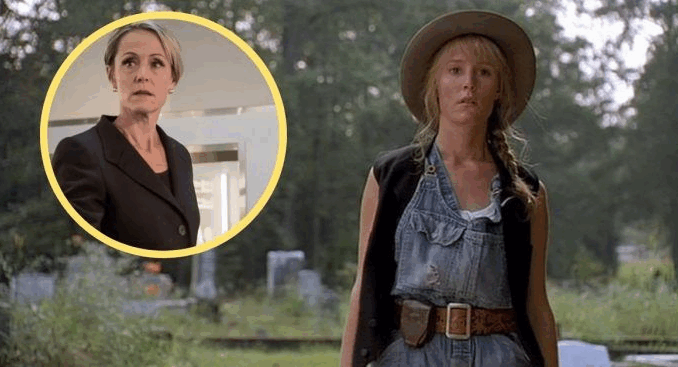
A Quiet Talent Waiting to Be Discovered
Before Fried Green Tomatoes premiered in 1991, Mary Stuart Masterson was not a household name. She had been steadily building her career with a series of well-received roles in films like Some Kind of Wonderful (1987) and Chances Are (1989), but she had not yet reached the level of recognition that would make her instantly identifiable to general audiences. That would change with her portrayal of the spirited, independent Idgie Threadgoode in Fried Green Tomatoes.
Many viewers came to the movie without knowing who she was. But from the moment she appeared on screen—confident, defiant, and deeply human—Mary Stuart Masterson became unforgettable. The role didn’t just make people notice her; it made them feel like they knew her.
Why Idgie Threadgoode Changed Everything
The film’s story revolves around friendship, resilience, and community, themes that resonated deeply with audiences in the early 1990s and still do today. Masterson’s Idgie was the beating heart of that story—a tomboy with a fierce sense of justice, a hidden tenderness, and a loyalty that ran deeper than blood.
For many who watched, Idgie felt real. Masterson didn’t play her as a one-note rebel; she played her as a complex woman shaped by love, loss, and the constraints of her time. It’s no wonder that people left the theater wanting to know more about the actress behind the character.
The Element of Surprise
One of the reasons Masterson’s performance left such a mark was the element of surprise. Unlike some actors who come into a film with a built-in celebrity persona, Masterson was a blank canvas to much of the public. Audiences had no preconceived notions, which meant they could fully immerse themselves in Idgie’s world without distraction.
This fresh discovery created a unique bond. Viewers felt as if they had “found” her themselves—an actress whose talent spoke for itself, not one riding the wave of fame. That sense of personal discovery often leads to a deeper, longer-lasting appreciation.
Career Before and After Fried Green Tomatoes

Before the film, Masterson’s roles often positioned her as the intelligent, slightly unconventional romantic lead. She was known for her understated emotional delivery and an ability to bring warmth to characters who might otherwise be overlooked.
After Fried Green Tomatoes, the industry and the public saw her in a new light. She became associated with roles that required emotional strength and layered performances. The success of the film opened doors to more ambitious projects, both in film and on stage. She appeared in Benny & Joon (1993), further cementing her reputation as a versatile and deeply relatable actress.
Why Audiences Fell in Love with Her
Mary Stuart Masterson’s appeal in Fried Green Tomatoes went beyond good acting. She embodied qualities audiences admire—authenticity, courage, and kindness wrapped in an unapologetic sense of self. She wasn’t trying to be glamorous in the Hollywood sense; she was simply present in the role, fully believable.
Her chemistry with Mary-Louise Parker, who played Ruth Jamison, also played a major role in the film’s impact. Their on-screen connection conveyed deep affection and unspoken love, creating an emotional core that stayed with viewers long after the credits rolled.
The Legacy of Idgie and Masterson’s Place in Film History
Three decades later, Fried Green Tomatoes is still celebrated as a film about female friendship, empowerment, and resilience. Idgie Threadgoode remains one of the most beloved characters in 1990s cinema, and Masterson’s portrayal is considered definitive—impossible to imagine being done by anyone else.
For those who discovered Mary Stuart Masterson through this role, the film was more than entertainment—it was a doorway into appreciating her entire body of work. Many fans sought out her earlier films, followed her later projects, and even attended stage performances to see the range of her talent.
Continuing to Work with Integrity
While Masterson never pursued fame in the tabloid sense, she continued to work steadily in film, television, and theater. Her choices often leaned toward roles that had substance, whether in independent films or character-driven dramas. She also expanded her career to include directing, further showcasing her understanding of storytelling.
In interviews, she has often spoken about valuing the craft over celebrity, a mindset that perhaps explains why her performances feel so genuine. She approaches her characters from the inside out, prioritizing truth over showmanship.
The Enduring Connection with Audiences
Today, fans who first saw her in Fried Green Tomatoes still speak of that moment of discovery—of watching a film without expectations and leaving with a new favorite actress. That initial connection often endures because it’s tied to a powerful emotional experience.
For many, rewatching the film is as much about revisiting Idgie Threadgoode as it is about remembering the first time they saw Mary Stuart Masterson bring her to life. It’s a reminder of how one performance can open the door to a lifelong admiration.
Conclusion: A Star Born in Whistle Stop
Mary Stuart Masterson didn’t need flashy marketing or headline-grabbing scandals to capture public attention. All she needed was the right role at the right time—and Fried Green Tomatoes was exactly that. For countless viewers, she will always be Idgie: brave, compassionate, and unforgettable. And for those who had never heard her name before 1991, discovering her in that role was like finding a hidden gem in the world of film.
Her career since has proven that the talent audiences fell in love with was no accident. Whether on screen or stage, Mary Stuart Masterson continues to bring the same depth, sincerity, and quiet power that first made her a beloved figure in cinema history.
